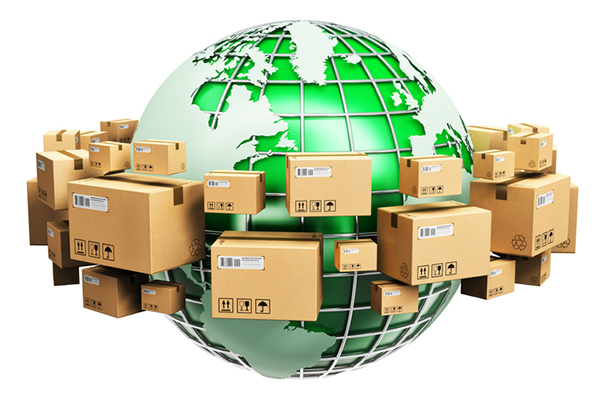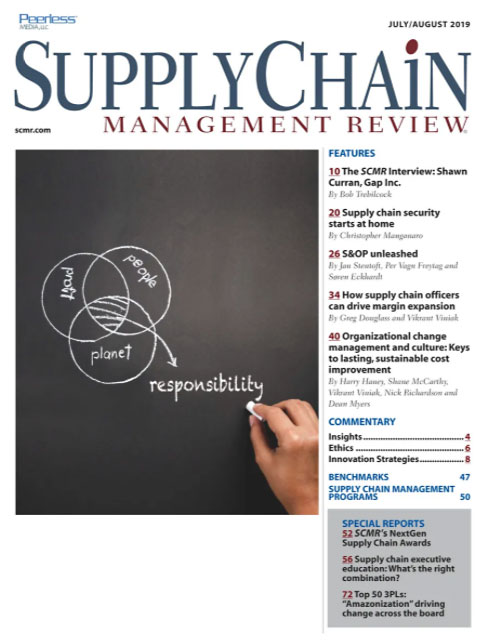Sorry, but your login has failed. Please recheck your login information and resubmit. If your subscription has expired, renew here.
July-August 2019
If you’re a long-time reader of Supply Chain Management Review, you’re familiar with Larry Lapide’s “Insights” column. Typically, Larry is writing about the many facets of planning, but occasionally, he takes on a provocative topic. One year, he questioned whether it was necessary to be a Top 25 supply chain leader, especially if in your industry, good enough gets the job done. Browse this issue archive.Need Help? Contact customer service 847-559-7581 More options
Last year, at an advisory board meeting of the Manufacturing Leadership Council we discussed renaming one of the major critical issues it addresses: manufacturing 4.0 sustainability. Now, sustainability is a broad topic including social responsibility and environmental consciousness, and so we kicked around some terms that might be used instead. Someone suggested “ethical” supply chains, to which I responded that the term ethical may imply judgment because it is about being right versus wrong and good versus bad. I preferred “responsible” supply chains instead. Why?
“Responsible” over “ethical”
Ethical is defined as an adjective “pertaining to or dealing with morals or the principles of morality; pertaining to right and wrong in conduct.” Responsible, meanwhile, means “answerable or accountable, as for something within one’s power, control, or management.” I believe the latter is more appropriate for business decisions, because the law dictates what businesses are legal (i.e., good) versus illegal (i.e., bad).
My first two “Insights” columns back in 2007* dealt with the fact that oil prices were starting to rise, and thus, putting at risk the benefits garnered from supply chain practices that were put in place during the era of cheap oil. Because oil and other carbon-based energy sources are non-renewal, I advised that oil be squeezed out of existing supply chains, such as by slowing them down. The rationale I offered was primarily to alleviate increasing costs, and to a secondary degree to reduce carbon-emissions detrimental to the environment. Managers could easily convince their executive team to reduce costs, but were less likely to convince them to reduce oil consumption only for environmental reasons.

This complete article is available to subscribers only.
Log in now for full access or start your PLUS+ subscription for instant access.
SC
MR
Sorry, but your login has failed. Please recheck your login information and resubmit. If your subscription has expired, renew here.
July-August 2019
If you’re a long-time reader of Supply Chain Management Review, you’re familiar with Larry Lapide’s “Insights” column. Typically, Larry is writing about the many facets of planning, but occasionally, he… Browse this issue archive. Access your online digital edition. Download a PDF file of the July-August 2019 issue.Last year, at an advisory board meeting of the Manufacturing Leadership Council we discussed renaming one of the major critical issues it addresses: manufacturing 4.0 sustainability. Now, sustainability is a broad topic including social responsibility and environmental consciousness, and so we kicked around some terms that might be used instead. Someone suggested “ethical” supply chains, to which I responded that the term ethical may imply judgment because it is about being right versus wrong and good versus bad. I preferred “responsible” supply chains instead. Why?
“Responsible” over “ethical”
Ethical is defined as an adjective “pertaining to or dealing with morals or the principles of morality; pertaining to right and wrong in conduct.” Responsible, meanwhile, means “answerable or accountable, as for something within one's power, control, or management.” I believe the latter is more appropriate for business decisions, because the law dictates what businesses are legal (i.e., good) versus illegal (i.e., bad).
My first two “Insights” columns back in 2007* dealt with the fact that oil prices were starting to rise, and thus, putting at risk the benefits garnered from supply chain practices that were put in place during the era of cheap oil. Because oil and other carbon-based energy sources are non-renewal, I advised that oil be squeezed out of existing supply chains, such as by slowing them down. The rationale I offered was primarily to alleviate increasing costs, and to a secondary degree to reduce carbon-emissions detrimental to the environment. Managers could easily convince their executive team to reduce costs, but were less likely to convince them to reduce oil consumption only for environmental reasons.
 SUBSCRIBERS: Click here to download PDF of the full article.
SUBSCRIBERS: Click here to download PDF of the full article.
SC
MR


Latest Supply Chain News
- How CPG brands can deliver on supplier diversity promises
- How S&OP provides the answer to in-demand products
- AI, virtual reality is bringing experiential learning into the modern age
- Humanoid robots’ place in an intralogistics smart robot strategy
- Tips for CIOs to overcome technology talent acquisition troubles
- More News
Latest Podcast

 Explore
Explore
Procurement & Sourcing News
- How CPG brands can deliver on supplier diversity promises
- How S&OP provides the answer to in-demand products
- There is still work to do to achieve supply chain stability
- Blooming success: The vital role of S&OE in nurturing global supply chains
- How one small part held up shipments of thousands of autos
- Shining light on procurement’s dark purchases problem
- More Procurement & Sourcing
Latest Procurement & Sourcing Resources

Subscribe

Supply Chain Management Review delivers the best industry content.

Editors’ Picks






